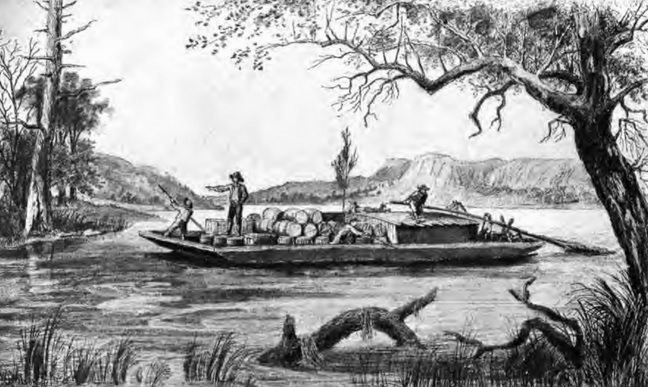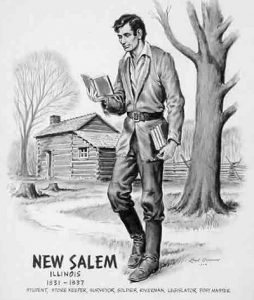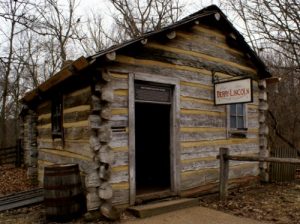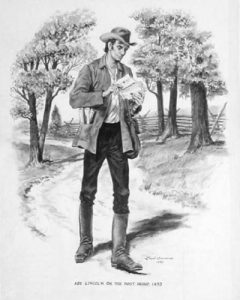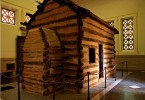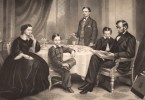Honest Abe
Lincoln lived in New Salem for 6 years from 1831 to 1836. During these years he spent his time reading and learning about law, he became an entrepreneur, fought in the Black Hawk War, run for the Illinois state legislature, became postmaster of New Salem and deputy county surveyor. Abraham worked hard and earned a reputation for honesty. Soon, people began calling him “Honest Abe”.
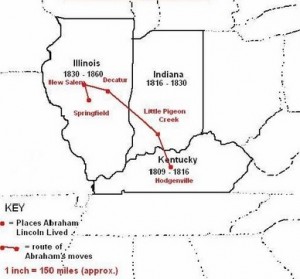
This map shows where Lincoln lived from his birth in 1809 until 1860 before he became president. Except for a period during his assignment in Congress in 1847.
Sangamon River
From very early on Abraham knew he did not want to be a farmer like his father. In 1831 he turned 21 and was no longer legally bound to his father. One day a local businessman by the name of Denton Offutt asked Abraham and John Hanks, Abraham’s first cousin, to build a float boat to transport provisions to New Orleans. The day the float boat was finished he left his family for good.
Lincoln worked for Offutt transporting goods on the Sangamon River. After visiting New Orleans he settled in New Salem, Illinois in April 1831 and made it his home for the next 6 years. He took odd jobs to make ends meet. The town was a commercial village that supplied goods to surrounding areas. Offutt opened a general store and made Lincoln its manager. Everyone grew fond of him, his sense of humor, storytelling and anecdotes were famous and soon the entire town became his most enthusiastic admirers. Offutt also put Lincoln in charge of the gristmill and the sawmill.
Interest in law and politics
Lincoln started taking interest in the town’s affairs by regularly attending sessions at the local court. He learned how to draft simple legal documents and became a member of the debate club. His popularity had soared and in 1832 residents of New Salem suggested him to run for the State legislature in order to represent the town’s economic interest. This period of his life represents a turning point in his interest for politics, thus marking the beginning of Lincoln’s political career.
Abraham was well known in New Salem but not in the rest of the county. He was 23 and competing with older and more experienced men. He ran for the position by advocating for improved navigation of the Sangamon River using his practical experience as a navigator. He challenged the construction of the railroad which would bypass New Salem leaving the town at a disadvantage.
Black Hawk War
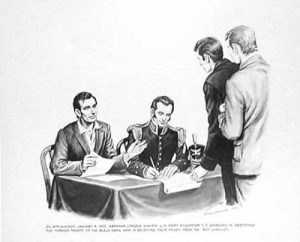
Lincoln identifying his Black Hawk War troops so they can receive their wages. Source: Print by Loyd Ostendorf
Suddenly Abraham lost his job as Offutt had overextended his capital and had to close business in New Salem. Without any means of income he volunteered to serve in the Black Hawk War.
In May 1832 the Sauk and Fox Indians returned to their land in North West Illinois. Its leader was Black Hawk and wanted to reclaim their ancestral land returning with 450 warriors and children. Lincoln and other men from New Salem joined the service. Because of his popularity he was elected officer of his company, this was his first experience as a leader. His role in the military was not in a position of risk or was it ever dangerous. During his service he became acquainted with John Todd Stuart, a Springfield lawyer who would become his law partner a few years later. For his services he was paid $110 and $14 for enlisting.
Entrepreneur
After the Black Hawk War Abraham Lincoln tried his luck at entrepreneurship when opportunity came to buy a general store. He did not have capital and signed a note for his 50% share. The other half was owned by William Berry. There was rarely enough business and by the following year they had to close the store. New Salem was not growing and trade on the Sangamon River was not thriving, there were no roads or railroad to take surplus produce to other towns.
Postmaster and Surveyor
Lincoln served as a postmaster for the town of New Salem from 1833 to 1836. His job was to deliver mail and collect payment of the postage fee as the recipient of the letter, not the sender, paid the postage. Newspapers also paid postage fee. When recipients did not come to pick up their mail he would deliver it at no extra charge. This appointment as a postmaster gave Lincoln the opportunity to talk people and get to know the community. It also gave him enough spare time to read law books and newspapers.
As postmaster Lincoln received a percentage of all receipts. It is estimated that he earned about $150 to $175 for his three years in service. However this income was not enough to make a living and as a way to supplement his income he took the job of land surveyor. He studied geometry and trigonometry as well as surveying treatises, very soon he was able to go to the field. Surveying was a difficult and very physical job as he and his aides had to push into swamps, woods and wilderness to take measurements. Again, during his surveying years he got to know many of the owners of the lots he surveyed by first names.

